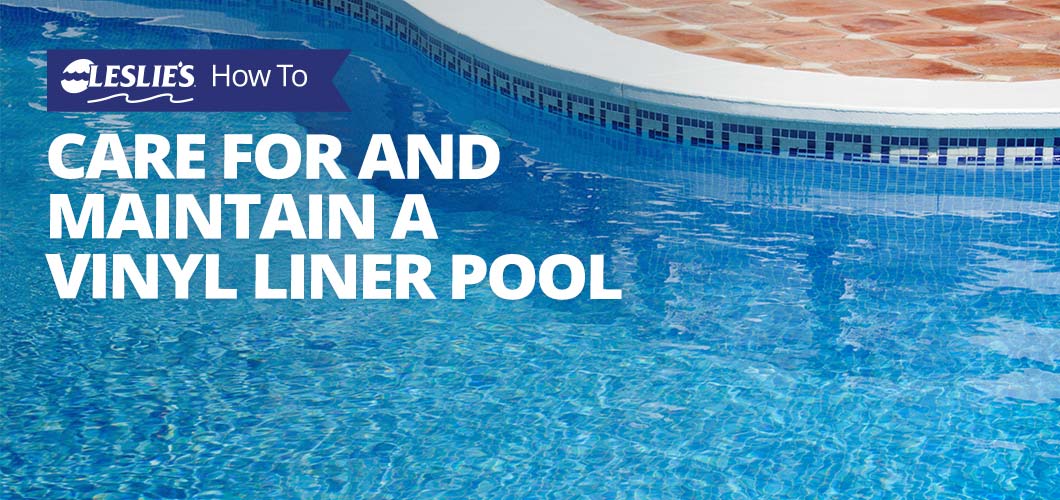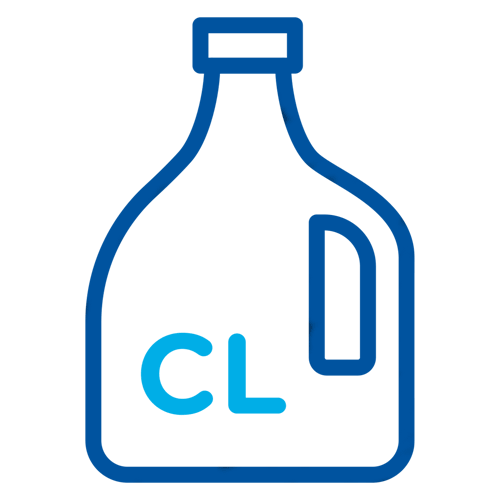
How to Care For and Maintain a Vinyl Liner Pool
Many pool owners around the country use vinyl pool liners to add a beautiful aesthetic to their swimming pool. Vinyl pool liners offer many benefits, like vibrant color options, smooth surfaces, and easy maintenance. That being said, caring for your inground or above ground vinyl liner pool requires diligent care to keep it looking like new and help it last for many years to come.
While these liners are generally robust in protecting the pool’s structure, they have their vulnerabilities, requiring special careful attention. For example, it’s important to practice caution with the choice of chemicals and cleaning tools used for your pool. The average vinyl pool liner can usually last around 5–10 years, but proper care will help your pool liner last as long as possible. We'll show you how with these tips.
Maintain Proper Water Chemistry
The majority of pool liner issues can be attributed to the mishandling of pool chemicals, with levels either too high or too low. Improper chemical balance may result in excessive water absorption, leading to wrinkles in the pool liner. Elevated levels of pool sanitizers — be it chlorine or bromine — or acidic water caused by low pH are often the primary culprits behind this excessive water absorption, as this increases surface porosity. Water imbalances can also have a negative impact on the plasticizers in your vinyl pool liner, leaving the liner brittle and prone to cracks.
Maintaining proper water balance, specifically pH, is crucial as it regulates the effectiveness of the pool sanitizer. Damages caused by poor water chemistry are irreversible, so it's important to be proactive with your water balance protocol.

Basic Water Chemistry Guide
When testing your water each week, make sure the water chemistry is within the following ranges:
- pH Level: 7.4–7.6
- Total Alkalinity: 80–120 ppm
- Free Chlorine: 1.0–4.0 ppm
- Calcium Hardness: 200–400 ppm
- Stabilizer (CYA): 30–100 ppm
You can learn more about the ins and outs of water chemistry with Leslie’s Pool Water Balancing Guide.
Don’t Empty Your Pool
Consult a pool professional before completely emptying your pool. The older the liner, the greater the risk of it shrinking or puckering and being unable to return to its original shape without tearing. If you need to lower water chemistry levels through dilution, the best way to do it is to drain a foot, then add a foot of fresh water at a time

Avoid Non-Pool Toys
While certain toys might seem harmless for pool play — even if they're not explicitly designed for swimming — using the wrong toys in your pool can lead to significant vinyl liner damage. Toys explicitly made for pool use are designed with the pool’s interior in mind to avoid potential damage to sensitive surfaces, like vinyl liners. Typically, these pool toys are soft-sided or made of materials that are unlikely to harm your liner. Objects without those characteristics can easily puncture or tear a liner.
Brush The Walls, Ladders, and Corners of Your Pool
Minimize algae buildup by brushing it into the water, allowing your sanitizer to effectively eliminate it. The waterline often accumulates common substances like body oil, suntan lotion, and baby oil, which, when exposed to sunlight and high temperatures, can discolor and become difficult to remove from the vinyl. Using an enzyme product can help prevent and remove this waterline discoloration. If necessary, wipe the liner clean weekly using a soft cloth and pool water. For more stubborn stains, consider using a gentle vinyl cleaner. Last but not least, make sure to use a vinyl pool vacuum (with brushes) or automatic pool cleaner that was designed for vinyl pool liners. This also goes for the pool brush — a soft nylon brush works best for vinyl pools.

Use Chlorine Sparingly
Overusing chlorine is a common mistake people make with their liners. Maintain a clean and well-sanitized pool so you don't have to superchlorinate to high levels, like when treating an algae bloom.
When you need to shock your pool, always follow product label instructions, and make sure any undissolved granules don't settle down and bleach the pool floor. Liquid chlorine is a popular choice for vinyl liner pools, for this very reason. For maintaining daily chlorine levels, in-line or off-line automatic chlorinators for chlorine tablets are a low-maintenance option.
BONUS TIP: Some vinyl liner manufacturers recommend against using floating chlorine dispensers. This is because the acidic nature of the tablets can cause the liner to fade or crack if the floater rests against the pool surface for too long. If you do use a chlorine floater, just keep an eye on placement to avoid issues. If it likes to hang out in one corner of the pool, or if it frequently gets caught near the skimmer opening, look into other chemical dispenser options.
Keep Pets Out of the Pool
As much as your dog may love taking a dip in the pool from time to time, their toenails can quickly rip a vinyl liner. If your dog must swim, make sure they stay away from the walls, and provide an easy entry and exit method for them that prevents contact with your vinyl liner.
Closing a Vinyl Pool Liner for the Winter
If you’re ready to winterize your pool and close it down for colder weather, keep these tips in mind to protect your vinyl pool liner.
- Start off by testing the water and balancing the chemical levels.
- Next, we recommend circulating the pool water for several hours after adding your sanitizer, balancers, or winterizing chemicals. If the water is not circulated properly, chlorine granules or water balancers may settle to the floor and bleach, discolor, or otherwise damage your pool liner.
- Now, the no-brainer: clean and vacuum your swimming pool from top to bottom. Don’t forget to spot clean the hard-to-reach areas of your pool, like the steps, coves, corners, and so forth.
- Adjust the water level per the pool manufacturer’s recommendations, but remember not to drain too much from your vinyl pool!
- Winterize your plumbing and equipment to prevent freeze damage.
- If using a winter pool cover, tightly seal the cover around the perimeter of your pool to prevent dirt and debris from getting in the pool during the off-season. Using an air pillow on an above ground pool can help prevent outward ice expansion, which can damage the walls.
A vinyl pool liner is a big investment. To ensure its longevity and lasting beauty, proper maintenance is essential. If you have any other questions about maintaining, installing, and caring for your vinyl pool liner, we can help! Stop by your local Leslie’s and speak with one of our pool experts. We offer vinyl pool liner solutions for both inground and above ground pools.